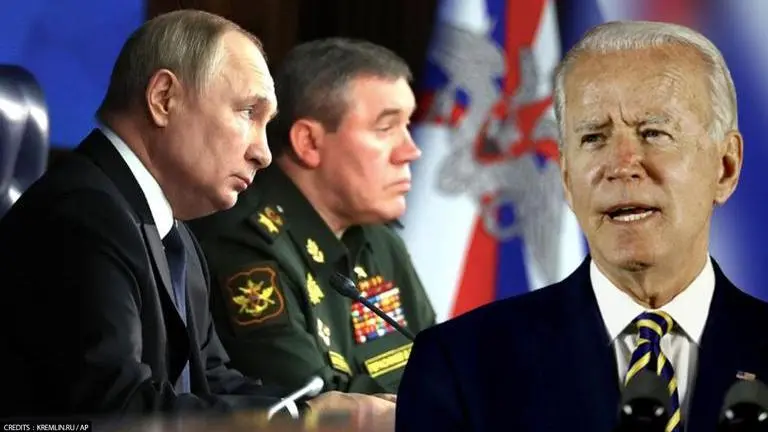Updated 13 January 2023 at 17:42 IST
Russia's restructuring of military command depicts 'systemic challenges', says Pentagon
"It likely does reflect some of the systemic challenges that the Russian military has faced since the beginning of this invasion," said US Brigadier General.
- World News
- 5 min read

Russia's recent reshuffling of the military ranks in the middle of the ongoing conflict in Ukraine is a reflection of the "systemic challenges" faced by Russia's President Vladimir Putin's army, the Pentagon claimed on Thursday, Jan. 12. The appointment of Russian Chief of the General Staff Valery Gerasimov as head of the Russian military goes to show the many challenges and shortcomings that have plagued Moscow's armed forces, US Brigadier General Pat Ryder, Pentagon's press secretary said during his White House press briefing.
Russia replaced General Sergey Surovikin just three months into his role, restructuring the military abruptly citing the "expanded scale of the tasks." Surovikin will now serve as the deputy to Gerasimov, the Russian Defense Ministry announced in a statement, adding that the reshuffle of the military was executed due to “closer interaction between the branches of the Armed Forces.” The Pentagon spokesperson on Thursday speculated that the change of the military's hierarchy by Moscow and the removal of the armed forces top brass demonstrates the existing problems within the Russian Defense ministry.
The Chief of the General Staff of Russia's Armed Forces, Surovikin, is a longtime Putin loyalist and had participated in the planning of the invasion of Ukraine.
Logistics, command and control problems
US think-tank, the Institute for the Study of War (ISW), in its analysis noted that his appointment "serves the dual goal of signaling a likely resumption of offensive operations in 2023 and being the result of an internal power struggle to reassert the Defense Ministry’s 'primacy.'"
Advertisement
"It likely does reflect some of the systemic challenges that the Russian military has faced since the beginning of this invasion," Brigadier General Pat Ryder said at a news briefing.
"We've talked about some of those things, in terms of logistics problems, command and control problems, sustainment problems, morale and the large failure to achieve the strategic objectives that they've set for themselves," he added.
Ryder also noted that the US is "absolutely supportive" of Ukraine's defense capabilities, adding that the allies and partners will provide the military equipment needed to deter Russian aggression. Washington has recently approved supplying Ukraine with Bradley Fighting Vehicles, a move widely berated by Russia that warned the US and its allies might become a direct party in the conflict. "We certainly are supportive of any type of capability that will give the Ukrainians an advantage on the battlefield," Ryder meanwhile clarified.
Has Russia replaced commander 'with an incompetent one'?
Russia has “demoted its most competent senior commander and replaced him with an incompetent one," Rand Corporation senior researcher Dara Massicot claimed in a tweet. “This is a story that has it all: infighting, power struggles, jealousy,” Massicot maintained. Military experts have, in turn, speculated that the appointment of Gerasimov shows the Russian shadowy mercenary group Wagner’s “increasingly influential and public role in the war.” His appointment comes amid a series of new large-scale position changes made in Russia's military command as the country prepares to intensify its “special military operation” in Ukraine in 2023.
Advertisement
Russia's MoD, in a statement, said that Gerasimov will work with the deputies namely Gen. Sergey Surovikin, commander-in-chief of the Aerospace Forces; Gen. Oleg Salyukov, commander-in-chief of the Ground Forces; and Col. Gen. Alexei Kim, deputy chief of the general staff of the Russian armed forces. Speculations arose that the Russian MoD has appointed Col. Gen. Alexander Lapin as the chief of the Army's ground forces in yet another major restructuring, although Kremlin spokesman Dmitry Peskov did not publicly admit or deny the changes to the military position at a state press briefing.
Russian Defense Minister Sergei Shoigu, left, and Chief of the Russian General Staff Valery Gerasimov attend the meeting with Russian President Vladimir Putin during his visit to the joint staff of troops involved in Russia's military operation in Ukraine. Credit: AP
In a separate war intelligence, the UK's Ministry of Defence said that Gerasimov's appointment was "a significant development in Russian President Vladimir Putin's approach to managing the war." "The deployment of the [chief of the general staff] as theatre commander is an indicator of the increasing seriousness of the situation Russia is facing, and a clear acknowledgment that the campaign is falling short of Russia's strategic goals," read UK's intelligence update.
Russia's Defense Minister Sergei Shoigu, meanwhile, handed the new military deputies a list of the improvements expected that included enhancement in forces' command, communication, and training as they intensified the offensive in Ukraine's eastern flank.
"The increase in the level of leadership of the special military operation is connected with the expansion in the scale of tasks, the need to organize closer contact between different branches of the armed forces and improve the quality, and effectiveness of the management of Russian forces," the Russian ministry wrote in a statement it released on Thursday.
Published By : Zaini Majeed
Published On: 13 January 2023 at 17:42 IST

